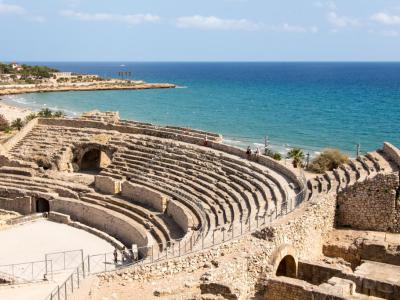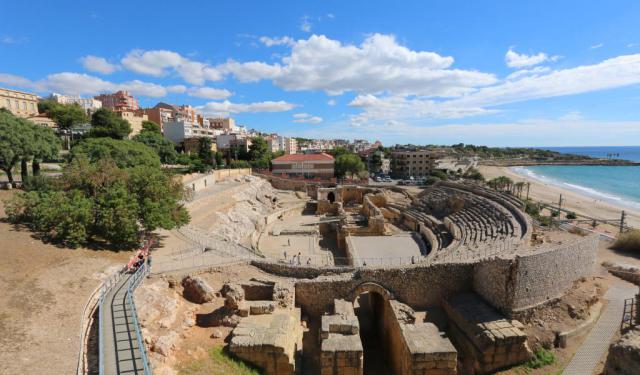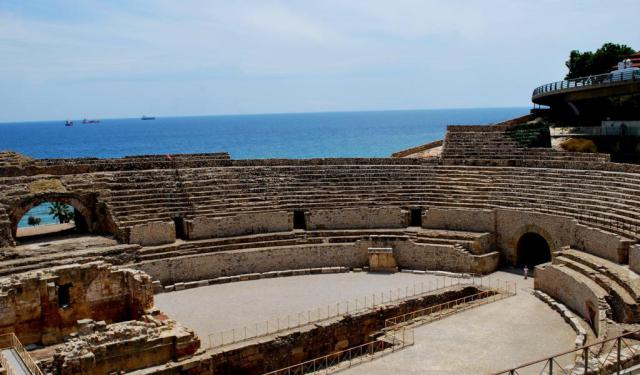Anfiteatro (Amphitheatre), Tarragona (must see)
Situated within the archaeological ensemble of Tarraco, a UNESCO World Heritage site, the Amphitheatre showcases the rich history and cultural significance of the region during the Roman era.
Constructed in the 2nd century AD, the Tarragona Amphitheatre was a pivotal center for gladiatorial contests, animal hunts, and other public spectacles that played a crucial role in Roman social and cultural life. The amphitheatre's strategic location, overlooking the Mediterranean Sea, further enhanced its appeal as a venue for grand events.
Key features of the Tarragona Amphitheatre include its elliptical shape, well-preserved seating tiers, and a network of tunnels and chambers beneath the arena floor. The elliptical design, a hallmark of Roman amphitheatres, allowed for optimal visibility and acoustics, ensuring that the audience could witness the events with maximum impact.
The seating tiers, arranged in a series of concentric rings, could accommodate thousands of spectators, emphasizing the amphitheatre's role as a communal space for entertainment and social gatherings. The tiered seating also reflected the hierarchical structure of Roman society, with different sections designated for various social classes.
Beneath the arena floor, a complex system of tunnels and chambers served practical purposes, facilitating the movement of gladiators, animals, and stage props during performances. These subterranean spaces provided a backstage area for the elaborate spectacles that unfolded above ground.
Today, the Tarragona Amphitheatre stands as a well-preserved archaeological site, inviting visitors to explore its ancient grandeur. The site offers panoramic views of the surrounding landscape. Interpretative displays and guided tours contribute to a deeper understanding of the historical context and significance of this iconic structure.
Constructed in the 2nd century AD, the Tarragona Amphitheatre was a pivotal center for gladiatorial contests, animal hunts, and other public spectacles that played a crucial role in Roman social and cultural life. The amphitheatre's strategic location, overlooking the Mediterranean Sea, further enhanced its appeal as a venue for grand events.
Key features of the Tarragona Amphitheatre include its elliptical shape, well-preserved seating tiers, and a network of tunnels and chambers beneath the arena floor. The elliptical design, a hallmark of Roman amphitheatres, allowed for optimal visibility and acoustics, ensuring that the audience could witness the events with maximum impact.
The seating tiers, arranged in a series of concentric rings, could accommodate thousands of spectators, emphasizing the amphitheatre's role as a communal space for entertainment and social gatherings. The tiered seating also reflected the hierarchical structure of Roman society, with different sections designated for various social classes.
Beneath the arena floor, a complex system of tunnels and chambers served practical purposes, facilitating the movement of gladiators, animals, and stage props during performances. These subterranean spaces provided a backstage area for the elaborate spectacles that unfolded above ground.
Today, the Tarragona Amphitheatre stands as a well-preserved archaeological site, inviting visitors to explore its ancient grandeur. The site offers panoramic views of the surrounding landscape. Interpretative displays and guided tours contribute to a deeper understanding of the historical context and significance of this iconic structure.
Want to visit this sight? Check out these Self-Guided Walking Tours in Tarragona. Alternatively, you can download the mobile app "GPSmyCity: Walks in 1K+ Cities" from Apple App Store or Google Play Store. The app turns your mobile device to a personal tour guide and it works offline, so no data plan is needed when traveling abroad.
Anfiteatro (Amphitheatre) on Map
Sight Name: Anfiteatro (Amphitheatre)
Sight Location: Tarragona, Spain (See walking tours in Tarragona)
Sight Type: Attraction/Landmark
Guide(s) Containing This Sight:
Sight Location: Tarragona, Spain (See walking tours in Tarragona)
Sight Type: Attraction/Landmark
Guide(s) Containing This Sight:
Walking Tours in Tarragona, Spain
Create Your Own Walk in Tarragona
Creating your own self-guided walk in Tarragona is easy and fun. Choose the city attractions that you want to see and a walk route map will be created just for you. You can even set your hotel as the start point of the walk.
Tarragona Introduction Walking Tour
Nestled in the southern part of Catalonia, Spain, Tarragona is a coastal city boasting an abundance of ancient Roman ruins, rolling mountains, and magnificent beaches.
Shrouded in myth and mystery, Tarragona carries a name whose origins remain debated-linked to figures like Tarraho or Tearcon the Ethiopian, a seventh-century BC pharaoh. Its true founding date is also obscured in time.
... view more
Tour Duration: 2 Hour(s)
Travel Distance: 2.7 Km or 1.7 Miles
Shrouded in myth and mystery, Tarragona carries a name whose origins remain debated-linked to figures like Tarraho or Tearcon the Ethiopian, a seventh-century BC pharaoh. Its true founding date is also obscured in time.
... view more
Tour Duration: 2 Hour(s)
Travel Distance: 2.7 Km or 1.7 Miles
Roman Ruins Walking Tour
The city of Tarraco, the capital of the Hispania Tarraconensis province, held significant prominence within the vast Roman Empire. The remnants of those days, concentrated in the heart of Tarragona, are the pivotal historical sites that contribute to its UNESCO World Heritage status.
Indeed, the city's acclaim largely stems from its Roman ruins, notably the 2nd-century AD Roman... view more
Tour Duration: 2 Hour(s)
Travel Distance: 2.9 Km or 1.8 Miles
Indeed, the city's acclaim largely stems from its Roman ruins, notably the 2nd-century AD Roman... view more
Tour Duration: 2 Hour(s)
Travel Distance: 2.9 Km or 1.8 Miles





